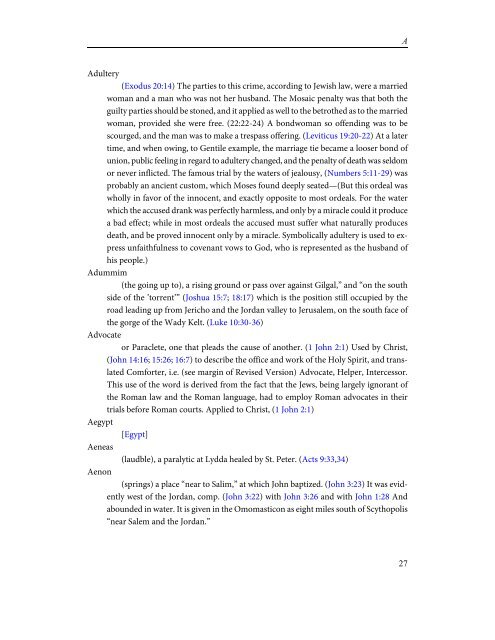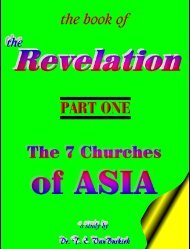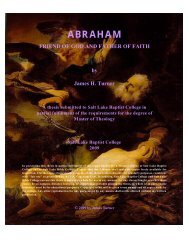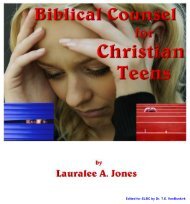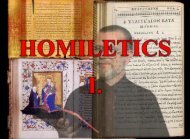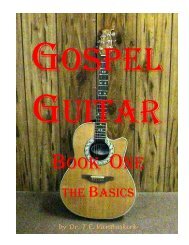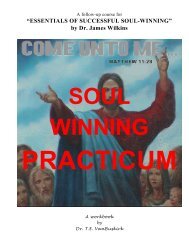- Page 2 and 3: Smith's Bible Dictionary Author(s):
- Page 4 and 5: Z Indexes Index of Scripture Refere
- Page 6 and 7: Smith’s Bible Dictionary William
- Page 8 and 9: Aaron (a teacher, or lofty), the so
- Page 10 and 11: Abdiel (the servant of God), son of
- Page 12 and 13: Abia, Course Of the eighth of the 2
- Page 14 and 15: Abihu (he (God) is my father), the
- Page 16 and 17: • Father of one of the twelve chi
- Page 18 and 19: Abomination Of Desolation Mentioned
- Page 20 and 21: years in his original residence at
- Page 22 and 23: Achan (troubler), an Israelite of t
- Page 24 and 25: Adadah (festival or boundary), one
- Page 26 and 27: Adamant the translation of the Hebr
- Page 28 and 29: Adina (slender), one of David’s c
- Page 30 and 31: Adonizedek (lord of justice), the A
- Page 34 and 35: of glory,” (Proverbs 16:31; 20:29
- Page 36 and 37: he showed by building an ivory hous
- Page 38 and 39: Ahaziah But Ahaz had to purchase th
- Page 40 and 41: Ahiam son of Sharar the Hararite (o
- Page 42 and 43: Ahinoam (brother of grace, i.e. gra
- Page 44 and 45: Aholibamah Or Abolibamah (my tabern
- Page 46 and 47: Akan (sharp sighted), son of Ezer,
- Page 48 and 49: Alexandria, Or Alexandria (from Ale
- Page 50 and 51: 11:4) The event was celebrated by a
- Page 52 and 53: Alphabet [Writing] Alphaeus (changi
- Page 54 and 55: defeated them near Hormah. (Numbers
- Page 56 and 57: • A descendant of Simeon (1 Chron
- Page 58 and 59: • The chief of the 112 sons of Uz
- Page 60 and 61: (3:10) with the Jordan valley on th
- Page 62 and 63: Anaiah (whom Jehovah answers). •
- Page 64 and 65: • One of the “heads of the peop
- Page 66 and 67: titles and agencies belonging to ea
- Page 68 and 69: • Spiritual anointing with the Ho
- Page 70 and 71: first called Christians (Acts 11:26
- Page 72 and 73: Aphik (strong), a city of Asher fro
- Page 74 and 75: Early in our Lord’s ministry he s
- Page 76 and 77: Ar (a city), or Ar of Moab, one of
- Page 78 and 79: • In northern and western Arabia
- Page 80 and 81: Arbah Hebron, or Kirjath-Arba, as
- Page 82 and 83:
Areli (heroic), a son of Gad. (Gene
- Page 84 and 85:
with gold, the mercy-seat was place
- Page 86 and 87:
lighter missile or “dart.” see
- Page 88 and 89:
Arodites [Arod] Aroer (ruins). •
- Page 90 and 91:
Asahel to (2 Chronicles 14:8) to 58
- Page 92 and 93:
Asenath (worshipper of Neith), daug
- Page 94 and 95:
Ashnah the name of two cities, both
- Page 96 and 97:
Aspalathus the name of some sweet p
- Page 98 and 99:
• Original peopling.—Scripture
- Page 100 and 101:
Ater • A place on the (south?) bo
- Page 102 and 103:
more dazzling by the transparent cl
- Page 104 and 105:
Atroth Attai and to cleanse them fr
- Page 106 and 107:
• The people of Avva, among the c
- Page 108 and 109:
Azaz Azaziah • The high priest in
- Page 110 and 111:
• The father of Jeziel and Pelet,
- Page 112 and 113:
Baal geographical. This word occurs
- Page 114 and 115:
• BAAL-HANAN. a. The name of one
- Page 116 and 117:
which could be traced in his time.
- Page 118 and 119:
Hinnom or ravine below Mount Zion.
- Page 120 and 121:
Balamo [Baal, Geogr. No. 6] Balance
- Page 122 and 123:
of ablution in the religious rites
- Page 124 and 125:
Bartholomew (son of Tolmai), one of
- Page 126 and 127:
Basmath (fragrant, pleasing), a dau
- Page 128 and 129:
Bealiah (Jehovah is lord), a Benjam
- Page 130 and 131:
Bedeiah one of the sons of Bani, in
- Page 132 and 133:
The five lesser wells are in a grou
- Page 134 and 135:
Belshazzar (prince of Bel), the las
- Page 136 and 137:
Beninu (our son), a Levite; one of
- Page 138 and 139:
Berachiah (blessed of Jehovah), a G
- Page 140 and 141:
Besom a brush or broom of twigs for
- Page 142 and 143:
Bethbirei (house of my creation), a
- Page 144 and 145:
Bethhaccerem (house of the vine). (
- Page 146 and 147:
Bethphage (g hard) (house of figs)
- Page 148 and 149:
Bezai (conqueror). “Children of B
- Page 150 and 151:
in Egypt, in 1628. It date back to
- Page 152 and 153:
Bilgai (Nehemiah 10:8) [Bilgah, 2]
- Page 154 and 155:
Bishopric the district over which t
- Page 156 and 157:
is mentioned in the genealogy of Ch
- Page 158 and 159:
• In his catalogue of the cities
- Page 160 and 161:
Bukki • Metaphorically of any sim
- Page 162 and 163:
Burnt Offering The word is applied
- Page 164 and 165:
Cage The term so rendered in (Jerem
- Page 166 and 167:
the animal draws as the wants of hi
- Page 168 and 169:
not moulded, but “of beaten work,
- Page 170 and 171:
The only interest attaching to Cape
- Page 172 and 173:
• Some were left in Samaria, ming
- Page 174 and 175:
Casiphia (silvery, white), a place
- Page 176 and 177:
Censer A small portable vessel of m
- Page 178 and 179:
were priests, magicians or astronom
- Page 180 and 181:
Chebel (cord), one of the singular
- Page 182 and 183:
Cherub, Cherubim The symbolical fig
- Page 184 and 185:
Chillon (pining, sickly), the son o
- Page 186 and 187:
land which yet was a vital point of
- Page 188 and 189:
the 3140 members of which the Churc
- Page 190 and 191:
Cities Of Refuge six Levitical citi
- Page 192 and 193:
promise without performance. (Prove
- Page 194 and 195:
Colosse more properly Colos’sae,
- Page 196 and 197:
(Numbers 10:3) The people were stri
- Page 198 and 199:
Corinthians are addressed. [EPISTLE
- Page 200 and 201:
on the island. St. Paul, on the ret
- Page 202 and 203:
truth discoverable by man, is one o
- Page 204 and 205:
foot separately, or possibly throug
- Page 206 and 207:
New Testament were often no doubt f
- Page 208 and 209:
and genius placed him at the head o
- Page 210 and 211:
Dan the north and the Awaj, which f
- Page 212 and 213:
interpreting dreams, on the occasio
- Page 214 and 215:
Darius (lord), the name of several
- Page 216 and 217:
life has come down to us—his conf
- Page 218 and 219:
The outrage on his daughter Tamar,
- Page 220 and 221:
to the qualifications for and the d
- Page 222 and 223:
days, but it did not require attend
- Page 224 and 225:
outward signs are sometimes referre
- Page 226 and 227:
• The delivery of the law as writ
- Page 228 and 229:
sion of Moab. (Isaiah 15:2; Jeremia
- Page 230 and 231:
the occupation of Jerusalem by Pomp
- Page 232 and 233:
the dog being an unclean animal, (I
- Page 234 and 235:
enunciated by St. Paul in (1 Corint
- Page 236 and 237:
a tunic furnished with sleeves and
- Page 238 and 239:
ing fuel in Syria, Arabia and Egypt
- Page 240 and 241:
Hebrew language discriminates betwe
- Page 242 and 243:
Ebedmelech (a king’s servant), an
- Page 244 and 245:
Eder (pleasure). • The first resi
- Page 246 and 247:
Education There is little trace amo
- Page 248 and 249:
• Ehud son of Gera, of the tribe
- Page 250 and 251:
Elasah (whom God made). • A pries
- Page 252 and 253:
• A Merarite Levite, son of Mahli
- Page 254 and 255:
Eliadah father of Rezon, the captai
- Page 256 and 257:
• Another of the same guard. (1 C
- Page 258 and 259:
Samaria. Again Elijah suddenly appe
- Page 260 and 261:
Eliphaz (God is his strength). •
- Page 262 and 263:
struck blind, and he misleads them
- Page 264 and 265:
Elkosh (God my bow), the birthplace
- Page 266 and 267:
Elzaphan (whom God protects), secon
- Page 268 and 269:
In the centre, round the tabernacle
- Page 270 and 271:
of a prophetic life spent in immedi
- Page 272 and 273:
Ephai (gloomy), a Netophathite, who
- Page 274 and 275:
taken a high position in the nation
- Page 276 and 277:
Er (watchful). • First-born of Ju
- Page 278 and 279:
Jonathan were overthrown. (Judges 7
- Page 280 and 281:
code of doctrines. There were isola
- Page 282 and 283:
Ethbaal (with Baal), king of Sidon
- Page 284 and 285:
Eurcquila the word used in the Revi
- Page 286 and 287:
and by the indulgence of the person
- Page 288 and 289:
disciples (Luke 10:17-19) and was,
- Page 290 and 291:
Ezra (help), called Esdras in the A
- Page 292 and 293:
Fable A fable is a narrative in whi
- Page 294 and 295:
Fat have been accompanied with the
- Page 296 and 297:
Ferret one of the unclean creeping
- Page 298 and 299:
Fir (Dr. Thomson), and it was not s
- Page 300 and 301:
• A cake of the first dough that
- Page 302 and 303:
Flesh [Flood] Flint a well-known st
- Page 304 and 305:
• In a more special sense, in (1
- Page 306 and 307:
plague of frogs is described, and t
- Page 308 and 309:
Gaal (contempt), son of Ebed, aided
- Page 310 and 311:
Gaddi (fortunate), son of Susi; the
- Page 312 and 313:
(the heap of witness), the name giv
- Page 314 and 315:
Gall sparkling look. It abounds in
- Page 316 and 317:
frequently to the latter. The Jews
- Page 318 and 319:
chambers over the gateway. (2 Samue
- Page 320 and 321:
ently those lying near to and along
- Page 322 and 323:
• Son of Hilkiah, was made the be
- Page 324 and 325:
or time, as contemporaries, (Genesi
- Page 326 and 327:
ancestor of Shimei who cursed David
- Page 328 and 329:
Gethsemane (an oil-press), a small
- Page 330 and 331:
• Gibeah of Saul. This is not men
- Page 332 and 333:
Gidom (desolation), a place named o
- Page 334 and 335:
• The “king of the nations of G
- Page 336 and 337:
Gleaning The gleaning of fruit tree
- Page 338 and 339:
Gold Gold was known from the very e
- Page 340 and 341:
comparing these four books one with
- Page 342 and 343:
of an army, (2 Chronicles 32:21) an
- Page 344 and 345:
• The two exceptions noticed abov
- Page 346 and 347:
Hadad (mighty), originally the indi
- Page 348 and 349:
Hagaba (locust). Bene Hagaba were a
- Page 350 and 351:
on occasions of festivity or hospit
- Page 352 and 353:
from this time it ceased to be a pl
- Page 354 and 355:
• Another of the chief laymen on
- Page 356 and 357:
Handicraft (Acts 18:3; 19:25; Revel
- Page 358 and 359:
• The “hangings”; were used f
- Page 360 and 361:
Harbona (ass-driver), the third of
- Page 362 and 363:
point to which the victorious Israe
- Page 364 and 365:
Hashabniah (whom Jehovah regards).
- Page 366 and 367:
Hauran (caverns), a province of Pal
- Page 368 and 369:
Hazer topographically, seems genera
- Page 370 and 371:
forms the oven. The cakes baked “
- Page 372 and 373:
Hebron • Contents .—With respec
- Page 374 and 375:
Helah (rust), one of the two wives
- Page 376 and 377:
esurrection, divided into two parts
- Page 378 and 379:
Hepherites, The the family of Hephe
- Page 380 and 381:
at this time, it is generally conce
- Page 382 and 383:
greedy, thick kneed, high-flying mi
- Page 384 and 385:
Hezir (Swine). • A priest in the
- Page 386 and 387:
coat was a tunic or long skirt of l
- Page 388 and 389:
gentleness, (Proverbs 5:19) feminin
- Page 390 and 391:
Hizkiah (might of Jehovah), an ance
- Page 392 and 393:
term debash applies to a decoction
- Page 394 and 395:
Hori (cave-dweller). • A Horite,
- Page 396 and 397:
Hosanna (save now). “Save, we pra
- Page 398 and 399:
hospitality. The neglect of Christ
- Page 400 and 401:
fire is made when required with cha
- Page 402 and 403:
strangers. Sufficient allusion to h
- Page 404 and 405:
• Father of Rephaiah, who was rul
- Page 406 and 407:
Hyaena Authorities differ as to whe
- Page 408 and 409:
Ibhar (whom God chooses), one of th
- Page 410 and 411:
During their long residence in Egyp
- Page 412 and 413:
• One of the heroes of David’s
- Page 414 and 415:
the people were removed from the te
- Page 416 and 417:
Irnahash (serpent city), a name whi
- Page 418 and 419:
• The second section, chs. 49-56,
- Page 420 and 421:
y the renewal of God’s promise to
- Page 422 and 423:
Ishui (quiet), the second son of Sa
- Page 424 and 425:
lowed by the cruel Menahem, who, be
- Page 426 and 427:
Ithiel (God is with me). • A Benj
- Page 428 and 429:
Izhar (oil), son of Kohath grandson
- Page 430 and 431:
Jaazer, Or Jazer (Jehovah helps), a
- Page 432 and 433:
Jachan Jachin (affliction), one of
- Page 434 and 435:
draelon, Sisera, their general, fle
- Page 436 and 437:
Jahzah (trodden down). (1 Chronicle
- Page 438 and 439:
with the Virgin Mary at Nazareth by
- Page 440 and 441:
(splended) The boundary of Zebulun
- Page 442 and 443:
Jashubilehem (turner back for food)
- Page 444 and 445:
Jecholiah (strong through Jehovah)
- Page 446 and 447:
Jehiel (treasured of God), a perfec
- Page 448 and 449:
Jehohanan (whom Jehovah gave), a na
- Page 450 and 451:
Jehonadab (whom Jehovah impels) and
- Page 452 and 453:
himself a zealous follower of the c
- Page 454 and 455:
of Jehovah, who appeared to prevent
- Page 456 and 457:
Jehud (praised), one of the towns o
- Page 458 and 459:
avoid. (But there is no word of app
- Page 460 and 461:
of the Chaldean army he showed his
- Page 462 and 463:
Jeremy the prophet Jeremiah. (Matth
- Page 464 and 465:
at the monarchy. He was leaving Jer
- Page 466 and 467:
compared with the sultry plains of
- Page 468 and 469:
hold 2,000,000 gallons. These reser
- Page 470 and 471:
• The Jaffa gate, in the west wal
- Page 472 and 473:
(Modern Jerusalem, called by the Ar
- Page 474 and 475:
• Son of Jehozadak, first high pr
- Page 476 and 477:
“Emmanuel,” “Son of David,”
- Page 478 and 479:
above) and by most others. Having b
- Page 480 and 481:
throughout the nations. Under the n
- Page 482 and 483:
• A town in Judah, in the neighbo
- Page 484 and 485:
Joah was sufficient to awaken the s
- Page 486 and 487:
• A descendant of Shelah the son
- Page 488 and 489:
Jobab special sin. They apply this
- Page 490 and 491:
• One of the sons of Nebo, who re
- Page 492 and 493:
when he forewarns them of the destr
- Page 494 and 495:
The History, ch. (John 1:19; John 2
- Page 496 and 497:
Jokmeam (gathered by the people), a
- Page 498 and 499:
warrior, (1 Chronicles 12:2) as is
- Page 500 and 501:
men of Jericho pursued the spies. (
- Page 502 and 503:
prophetic dreams. Joseph, being sen
- Page 504 and 505:
Joshaphat (whom Jehovah judges), th
- Page 506 and 507:
perstition were still carried on; b
- Page 508 and 509:
• The laws connected with the jub
- Page 510 and 511:
of Judea,” “Judea.” In a wide
- Page 512 and 513:
Judas Iscariot (Judas of Kerioth).
- Page 514 and 515:
ut it is placed about A.D. 65. The
- Page 516 and 517:
• Oppression of the Philistines,
- Page 518 and 519:
Kabzeel (gathered by God), one of t
- Page 520 and 521:
Kartan (double city), a city of Nap
- Page 522 and 523:
Kenath (possession), one of the cit
- Page 524 and 525:
Kibzaim (two heaps), a city of Moun
- Page 526 and 527:
difficulty presents itself. The Jew
- Page 528 and 529:
ore another, perhaps earlier, name
- Page 530 and 531:
Kneadingtroughs [Bread] Knife • T
- Page 532 and 533:
the same title as Psal 42, dedicate
- Page 534 and 535:
(Joshua 10:3,5) They were routed by
- Page 536 and 537:
Lamp • That part of the golden ca
- Page 538 and 539:
Lasharon (the plain), one of the Ca
- Page 540 and 541:
tiquity, we find an accommodation o
- Page 542 and 543:
and charity, either at the holy pla
- Page 544 and 545:
and of compulsory service, (1 Samue
- Page 546 and 547:
the law was the peculiar character
- Page 548 and 549:
Leather The notices of leather in t
- Page 550 and 551:
ange was assigned to the Israelites
- Page 552 and 553:
Lentils (Heb. ’adashim), a legumi
- Page 554 and 555:
welcome death. The dread of infecti
- Page 556 and 557:
and of the functions attached to it
- Page 558 and 559:
written by Moses. Those critics eve
- Page 560 and 561:
in the deep broad valleys of Palest
- Page 562 and 563:
limited to Hebrews only, from whom,
- Page 564 and 565:
Lords Day, The (Kuriake Hemera), (R
- Page 566 and 567:
our daily bread is sanctified. (10)
- Page 568 and 569:
Love Feasts (Agape), (2 Peter 2:13;
- Page 570 and 571:
show that Luke was now left behind.
- Page 572 and 573:
The fact that the Lycaonians were s
- Page 574 and 575:
Maacah (oppression). • The mother
- Page 576 and 577:
• Two priests of this name are me
- Page 578 and 579:
formed churches. The two other book
- Page 580 and 581:
had become very powerful, and a lar
- Page 582 and 583:
the wise men and religious teachers
- Page 584 and 585:
39:3) From the above data, may conc
- Page 586 and 587:
Mahlon (sick) the first husband of
- Page 588 and 589:
• Methim, “men,” always mascu
- Page 590 and 591:
narcotic, causing sleep, so that th
- Page 592 and 593:
Maon (habitation), one of the citie
- Page 594 and 595:
especting the evangelist. It is mos
- Page 596 and 597:
equality of man and wife. (5) The s
- Page 598 and 599:
The last act in the ceremonial was
- Page 600 and 601:
to us; those of the sons are, James
- Page 602 and 603:
But the great joy and love which he
- Page 604 and 605:
• A Levite, father of Zaccur and
- Page 606 and 607:
translated it into Greek. No notice
- Page 608 and 609:
for, but the hands of all the guest
- Page 610 and 611:
Medeba (water of rest), a town on t
- Page 612 and 613:
some of the monuments of Beni-Hassa
- Page 614 and 615:
Meholathite, The a word occurring o
- Page 616 and 617:
ut has been rendered fertile by ind
- Page 618 and 619:
Meni (fate, fortune). (Isaiah 65:11
- Page 620 and 621:
Reuben, Gad and Zebulun. (Joshua 21
- Page 622 and 623:
dense swamp of papyrus reeds, as la
- Page 624 and 625:
Meshillemoth (recompense). • An E
- Page 626 and 627:
quitting Ur of the Chaldees. (Genes
- Page 628 and 629:
gold was thus common, silver appear
- Page 630 and 631:
• The father of Abdon, a man of h
- Page 632 and 633:
• One of the princes of Jehoshaph
- Page 634 and 635:
Migdalel (tower of God), one of the
- Page 636 and 637:
Milk As an article of diet, milk ho
- Page 638 and 639:
• One of the priests at the dedic
- Page 640 and 641:
would not of itself be followed by
- Page 642 and 643:
close under the Ras en-Nakhura ; bu
- Page 644 and 645:
• Mizpeh, a city of Judah, (Joshu
- Page 646 and 647:
scattered many ruins of ancient cit
- Page 648 and 649:
Moli Mahli, the son of Merari. 1 Es
- Page 650 and 651:
egard as a proper name are mentione
- Page 652 and 653:
ase to enlarge the level surface fo
- Page 654 and 655:
the corpse in the sand. But the peo
- Page 656 and 657:
ance with this complete identificat
- Page 658 and 659:
Mourning One marked feature of Orie
- Page 660 and 661:
tremble and rustle with the slighte
- Page 662 and 663:
antiquity is full of the praises of
- Page 664 and 665:
• The dulcimer, (Daniel 3:5) a ki
- Page 666 and 667:
Naam (pleasantness), one of the son
- Page 668 and 669:
Nabal (fool) was a sheepmaster on t
- Page 670 and 671:
Nagge one of the ancestors of Chris
- Page 672 and 673:
Nail Nain and that the prophet was
- Page 674 and 675:
the acknowledgment of the sovereign
- Page 676 and 677:
Naum (consolation), son of Esli, an
- Page 678 and 679:
a submission to the letter of the r
- Page 680 and 681:
Abarim or Moab mountains, about thr
- Page 682 and 683:
Eusebius and Berosus also confirm t
- Page 684 and 685:
consideration of their poverty, dur
- Page 686 and 687:
Nemuel Nepheg (day of God). • A R
- Page 688 and 689:
• A chief of the Levites in the r
- Page 690 and 691:
own. It was a day of holy convocati
- Page 692 and 693:
• The appearance of the oldest MS
- Page 694 and 695:
judgment. Probably there are not mo
- Page 696 and 697:
faithfully the literal meaning of t
- Page 698 and 699:
Niger (black) is the additional or
- Page 700 and 701:
along the course of the Tigris over
- Page 702 and 703:
sculptured slabs from the effects o
- Page 704 and 705:
This explains the passage in Jeremi
- Page 706 and 707:
190 days (40+150, comparing) (Genes
- Page 708 and 709:
of its properties or otherwise we a
- Page 710 and 711:
definitely, but, as we may say, pre
- Page 712 and 713:
Syria and Palestine have been long
- Page 714 and 715:
Obadiah (servant of the Lord), •
- Page 716 and 717:
Obil (chief of the camels), a keepe
- Page 718 and 719:
Ointment (An oily or unctuous subst
- Page 720 and 721:
The upper and lower margins are gen
- Page 722 and 723:
At other times a passage is enlarge
- Page 724 and 725:
impressive events of Christian hist
- Page 726 and 727:
On (abode or city of the sun), a to
- Page 728 and 729:
sardonyx; white and reddish gray, t
- Page 730 and 731:
Oreb, The Rock the “raven’s cra
- Page 732 and 733:
perhaps the swiftest of all cursori
- Page 734 and 735:
Paarai In the list of (2 Samuel 23:
- Page 736 and 737:
quiring a residence of her own. The
- Page 738 and 739:
• Physical features.—Palestine
- Page 740 and 741:
of Bethlehem contains springs which
- Page 742 and 743:
This feature is the Jordan—the on
- Page 744 and 745:
the Arabian or one-humped camel, th
- Page 746 and 747:
Judea, is now comparatively rare, e
- Page 748 and 749:
involves really no comparison. The
- Page 750 and 751:
Parmenas (abiding), one of the seve
- Page 752 and 753:
For this indignity to God’s proph
- Page 754 and 755:
of the head of the family. The pasc
- Page 756 and 757:
lives are recorded in Scripture pre
- Page 758 and 759:
that the former persecutor was soon
- Page 760 and 761:
of the earthquake, the jailer’s t
- Page 762 and 763:
the narrative from the third to the
- Page 764 and 765:
their request, He invited them to f
- Page 766 and 767:
Peacocks (Heb. tuccyyim). Among the
- Page 768 and 769:
Pekod (visitation), an appellative
- Page 770 and 771:
Peninnah (coral or pearl), one of t
- Page 772 and 773:
Pentecost that is, the fiftieth day
- Page 774 and 775:
from the serpent being his characte
- Page 776 and 777:
privilege, but assisted the work by
- Page 778 and 779:
tion, when on the day of Pentecost
- Page 780 and 781:
admitted into the canon until the y
- Page 782 and 783:
which a patriotic writer at the cou
- Page 784 and 785:
Pharez (Perez, (1 Chronicles 27:3)
- Page 786 and 787:
hundred years preceding the Reforma
- Page 788 and 789:
Philemon, had run away from him to
- Page 790 and 791:
Datum, which was probably in its or
- Page 792 and 793:
time of Joshua, (Joshua 13:2) and e
- Page 794 and 795:
to God. The philosophy of the Jews
- Page 796 and 797:
the wise man aims is to be found, h
- Page 798 and 799:
about six miles south of Tyre, to t
- Page 800 and 801:
Phurah (bough), Gideon’s servant,
- Page 802 and 803:
Pilate (armed with a spear), Pontiu
- Page 804 and 805:
Pinon (darkness), one of the “duk
- Page 806 and 807:
Pithom (the city of justice), one o
- Page 808 and 809:
• The plague of the murrain of be
- Page 810 and 811:
to its inhabitants. The second plag
- Page 812 and 813:
Deborah and David. Judg 5; Psal 18.
- Page 814 and 815:
lue, purple and scarlet, ornamented
- Page 816 and 817:
Porter This word when used in the A
- Page 818 and 819:
at Rome, to which St. Paul refers,
- Page 820 and 821:
and the best fruits of their learni
- Page 822 and 823:
• Of a special tithe every third
- Page 824 and 825:
See (Acts 16:24) One of the readies
- Page 826 and 827:
ordinarily (so far as we know) belo
- Page 828 and 829:
class were not bound by circumcisio
- Page 830 and 831:
“psalms,” i.e., lyrical pieces
- Page 832 and 833:
was eventually to be manifested mus
- Page 834 and 835:
half brother Magas. Ptolemy bestowe
- Page 836 and 837:
11:18. Ptolemy Philometor is the la
- Page 838 and 839:
(lord), a country or nation mention
- Page 840 and 841:
• Precipitation, attempted in the
- Page 842 and 843:
Purosh (flea). The descendants of P
- Page 844 and 845:
Quails There can be no doubt that t
- Page 846 and 847:
Raamah (horse’s mane), a son of C
- Page 848 and 849:
Rachab Rahab the harlot. (Matthew 1
- Page 850 and 851:
constitutes only one continued seas
- Page 852 and 853:
Ramathaimzophim (the two heights of
- Page 854 and 855:
The instruments of his work were pr
- Page 856 and 857:
and specially “the sea of Suph .
- Page 858 and 859:
northward then at present. An exami
- Page 860 and 861:
• Kaneh, a reed of any kind. Thus
- Page 862 and 863:
Rehum (merciful). • One who went
- Page 864 and 865:
Rephaim, The Valley Of (1 Samuel 5:
- Page 866 and 867:
Reumah (elevated), the concubine of
- Page 868 and 869:
St. Paul’s ship. It was originall
- Page 870 and 871:
name is still found attached to a v
- Page 872 and 873:
Rogelim (fullers) the residence of
- Page 874 and 875:
• The occasion which prompted it,
- Page 876 and 877:
of Rome in the time of Nero, the
- Page 878 and 879:
and from 4 to 6 in width, and exten
- Page 880 and 881:
Ruth to be his wife, amidst the ble
- Page 882 and 883:
as well as thought. (5:14) These at
- Page 884 and 885:
Sabbatical Year Each seventh year,
- Page 886 and 887:
(Leviticus 24:6,9) 3, The special m
- Page 888 and 889:
than with those sacrifices of prais
- Page 890 and 891:
Salamis (suit), a city at the east
- Page 892 and 893:
The Jews appear to have distinguish
- Page 894 and 895:
of the past except its name, Sebust
- Page 896 and 897:
of the sacred historian, they “Fe
- Page 898 and 899:
ock of Etam, in the territory of Ju
- Page 900 and 901:
• But although the authorship can
- Page 902 and 903:
According to the Jerusalem Gemara t
- Page 904 and 905:
Sardonyx a name compounded of sard
- Page 906 and 907:
of evil spirits or angels who share
- Page 908 and 909:
Saw his reign he began to organize
- Page 910 and 911:
The punishment employed was beating
- Page 912 and 913:
for admission in the school of some
- Page 914 and 915:
Lebanon, and from the range of Leba
- Page 916 and 917:
more or less of salts and other mat
- Page 918 and 919:
• Mount Seir, an entirely differe
- Page 920 and 921:
• The father of Mattathias in the
- Page 922 and 923:
known as Sharon. The name occurs th
- Page 924 and 925:
valuable, and indeed indispensable,
- Page 926 and 927:
in Scripture to “eat dust,” see
- Page 928 and 929:
Shaaraim (two gates), a city in the
- Page 930 and 931:
• One of the sons of Bani. (Ezra
- Page 932 and 933:
Shammai (desolate). • The son of
- Page 934 and 935:
Shashak (longing), a Benjamite, one
- Page 936 and 937:
Shebah (an oath), the famous well w
- Page 938 and 939:
valley,” says Dr. Robinson, “wa
- Page 940 and 941:
part alone visible but on particula
- Page 942 and 943:
• The same as Meshelemiah and Sha
- Page 944 and 945:
• The eldest son of Obed-edom the
- Page 946 and 947:
Shenazar (splendid leader), son of
- Page 948 and 949:
Shephi (bareness), son of Shobal. o
- Page 950 and 951:
and the Gileadites, regarding every
- Page 952 and 953:
one of which makes it refer to the
- Page 954 and 955:
• The Ramathite who was over Davi
- Page 956 and 957:
Ship No one writer in the whole ran
- Page 958 and 959:
Shiphi (abundant), a Simeonite, fat
- Page 960 and 961:
Shobach (expansion), the general of
- Page 962 and 963:
• Shebuel the son of Heman the mi
- Page 964 and 965:
Shushaneduth (the lily of testimony
- Page 966 and 967:
Silas (contracted form of Silvanus,
- Page 968 and 969:
in Siloam, while one may be almost
- Page 970 and 971:
to the faction of the Zealots, who
- Page 972 and 973:
that in the law most of the sins wh
- Page 974 and 975:
air is wonderfully clear, both for
- Page 976 and 977:
with the ulterior view of her becom
- Page 978 and 979:
of slaves were of a menial characte
- Page 980 and 981:
ing countries; we may notice one na
- Page 982 and 983:
On the one hand, the narrative of G
- Page 984 and 985:
consequent foundation of cities in
- Page 986 and 987:
what was true in other forms of fai
- Page 988 and 989:
the seed is noticed, as the most ch
- Page 990 and 991:
some which have no web, but chase t
- Page 992 and 993:
almost superlative, phrases: “ful
- Page 994 and 995:
in (Job 13:27; 33:11; Acts 16:24) T
- Page 996 and 997:
have been a type among the Hebrews
- Page 998 and 999:
having there put up “booths” (s
- Page 1000 and 1001:
Susa (Esther 11:3; 16:18) [Shushan,
- Page 1002 and 1003:
fragrant. The Fruit grows directly
- Page 1004 and 1005:
and with the life and order of the
- Page 1006 and 1007:
Lebanon possesses the greatest inte
- Page 1008 and 1009:
Syrtis, The (Acts 27:17) in the Rev
- Page 1010 and 1011:
Tabernacle The tabernacle was the t
- Page 1012 and 1013:
the closest access to God. It was o
- Page 1014 and 1015:
the people were a type of consecrat
- Page 1016 and 1017:
meanings it stands in connection wi
- Page 1018 and 1019:
Tabrimon (properly Tabrimmon, i.e.
- Page 1020 and 1021:
Tahtimhodshi (lowlands of Hodshi?),
- Page 1022 and 1023:
emonstrance two points are remarkab
- Page 1024 and 1025:
Tarpelites, The A race of Assyrian
- Page 1026 and 1027:
Taxes I. Under the judges, accordin
- Page 1028 and 1029:
Tekoa, Or Tekoah (a stockade). •
- Page 1030 and 1031:
Temani [Teman] Temanite an inhabita
- Page 1032 and 1033:
confirmed by the statement in the b
- Page 1034 and 1035:
and being situated on a sort of roc
- Page 1036 and 1037:
Tent first table contained Duties t
- Page 1038 and 1039:
Teresh (strictness), one of the two
- Page 1040 and 1041:
were are vast treasures laid up in
- Page 1042 and 1043:
gratitude on receiving this welcome
- Page 1044 and 1045:
• The circumstance noted in (Acts
- Page 1046 and 1047:
of any of the other apostles. The w
- Page 1048 and 1049:
Thuhash (badger), son of Nahor by h
- Page 1050 and 1051:
eputation of possessing the sterner
- Page 1052 and 1053:
Tilon (gift), one of the four sons
- Page 1054 and 1055:
Timothy The disciple thus named was
- Page 1056 and 1057:
Tin St. Paul’s first and second i
- Page 1058 and 1059:
Tirzah an ancient Canaanite city, w
- Page 1060 and 1061:
that both his parents were Gentiles
- Page 1062 and 1063:
Tobijah • “Tobiah the slave, th
- Page 1064 and 1065:
of the door; when in the upper stor
- Page 1066 and 1067:
passed over in silence, though not
- Page 1068 and 1069:
maic, Greek, Latin, the three langu
- Page 1070 and 1071:
of the succeeding age, after this,
- Page 1072 and 1073:
to true and false systems. We may n
- Page 1074 and 1075:
treasure-cities. and the buildings
- Page 1076 and 1077:
Tryphon A usurper of the Syrian thr
- Page 1078 and 1079:
supplies of corn and oil, ceded to
- Page 1080 and 1081:
history of Tyre, which has never re
- Page 1082 and 1083:
Unclean Meats These were things str
- Page 1084 and 1085:
doves or young pigeons to be killed
- Page 1086 and 1087:
Uri Uriah (fiery). • The father o
- Page 1088 and 1089:
and Jehoiakim slew him with the swo
- Page 1090 and 1091:
• One of the sons of Bigvai, who
- Page 1092 and 1093:
Uzziah Uzziel (strength of Jehovah)
- Page 1094 and 1095:
Vajezatha (strong as the wind), one
- Page 1096 and 1097:
the Armenian patriarch, and Miesrob
- Page 1098 and 1099:
• The Syriac New Testament Versio
- Page 1100 and 1101:
from Scripture in the Homilies, the
- Page 1102 and 1103:
London to superintend the publicati
- Page 1104 and 1105:
mixture of barley and wine, and thu
- Page 1106 and 1107:
Vulture The rendering in the Author
- Page 1108 and 1109:
when the organization of the army w
- Page 1110 and 1111:
floor of the sanctuary, and, declar
- Page 1112 and 1113:
• The Attic talent is the standar
- Page 1114 and 1115:
culiar to the New Testament, and ar
- Page 1116 and 1117:
• The sakiyeh, or Persian wheel.
- Page 1118 and 1119:
presbutides Of the early Church. Th
- Page 1120 and 1121:
Luke 12:55) The west and southwest
- Page 1122 and 1123:
and ardent beverages of our western
- Page 1124 and 1125:
• In the case of the suspected wi
- Page 1126 and 1127:
judgment to wormwood.” (Amos 5:7)
- Page 1128 and 1129:
Syrian inscriptions. There is, howe
- Page 1130 and 1131:
they are therefore originally rathe
- Page 1132 and 1133:
Zabbai (pure). • One of the desce
- Page 1134 and 1135:
in a conspiracy of which Shallum wa
- Page 1136 and 1137:
Zamzummim (Deuteronomy 2:20) only,
- Page 1138 and 1139:
Zaza one of the sons of Jonathan, a
- Page 1140 and 1141:
Zebulun (a habitation), the tenth o
- Page 1142 and 1143:
• The representative of the pries
- Page 1144 and 1145:
Zedad (mountain side), one of the l
- Page 1146 and 1147:
Zelah (a rib), a city in the allotm
- Page 1148 and 1149:
Zer (flint), a fortified town in th
- Page 1150 and 1151:
spirit God had raised to go up to b
- Page 1152 and 1153:
• Father of Elishaphat, one of th
- Page 1154 and 1155:
towns of Judah in (Joshua 15:31) an
- Page 1156 and 1157:
• In the highland district, named
- Page 1158 and 1159:
death of Moses as one (of the landm
- Page 1160 and 1161:
Zuph a Kohathite Levite, ancestor o
- Page 1162 and 1163:
Index of Scripture References Index
- Page 1164 and 1165:
Index of Scripture References 36:26
- Page 1166 and 1167:
Index of Scripture References 30:35
- Page 1168 and 1169:
Index of Scripture References 16:1
- Page 1170 and 1171:
Index of Scripture References 15:13
- Page 1172 and 1173:
Index of Scripture References 3:15
- Page 1174 and 1175:
Index of Scripture References 18:17
- Page 1176 and 1177:
Index of Scripture References 8:13
- Page 1178 and 1179:
Index of Scripture References 5:23
- Page 1180 and 1181:
Index of Scripture References 25:1
- Page 1182 and 1183:
Index of Scripture References 8:6 8
- Page 1184 and 1185:
Index of Scripture References 20:24
- Page 1186 and 1187:
Index of Scripture References 28:25
- Page 1188 and 1189:
Index of Scripture References 25:15
- Page 1190 and 1191:
Index of Scripture References 1:2 1
- Page 1192 and 1193:
Index of Scripture References 22:10
- Page 1194 and 1195:
Index of Scripture References 23:26
- Page 1196 and 1197:
Index of Scripture References 1:1 1
- Page 1198:
You might also enjoy these classic


